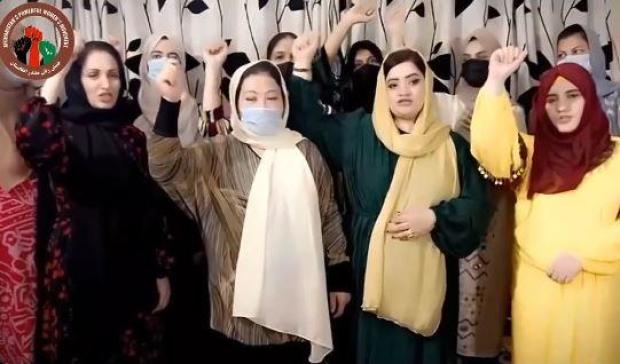
Afghan women raise their voices in song in online protests against Taliban’s bid to silence them
Afghan women have turned to social media to protest the latest draconian edict issued by Afghanistan‘s Taliban rulers, which the Biden administration says is aimed at erasing them completely from society. Women both inside and outside the country have posted poignant videos of themselves singing — a defiant response to the Taliban’s latest restrictive laws prohibiting women and girls from using their voices or showing their faces outside their homes.
As CBS News reported, Article 13 of the 114-page law adopted by Afghanistan’s Taliban rulers in August states that if a woman leaves her own home, “she is obligated to hide her voice, face, and body.”
The Biden administration said the law sought to remove women completely from public life in Afghanistan and it has expressed growing frustration with the country’s Taliban regime, which swept back to power in the summer of 2021 as U.S. and allied forces pulled out in a chaotic withdrawal.
said Tuesday in a social media post. “My message was clear: our support for the Afghan people remains steadfast but patience with the Taliban is running out.”
In response to the Taliban’s ongoing crackdown on human rights, activists and campaigners in Afghanistan, who already live under intense Taliban scrutiny, started uploading protest videos to social media of themselves signing and blasting the law as ignorant and repressive.
CBS News interviewed three women in Afghanistan who took part in the campaign. All of them said they would continue to defy the Taliban’s new law because they have nothing left to lose, and they urged the international community to shame the Taliban for its gender-based oppression. The women concealed their identities in their videos, and CBS News is identifying them only by their first names to protect their safety.
Afghan women have been subjected to harassment, detention and even physical assault for daring to advocate for their fundamental rights since the Taliban’s return to power.
“Despite the uncertain future and danger we face daily, women in Afghanistan will not silence their voices,” Zuhal, who was forced to abandon her education after 10th grade due to the Taliban’s draconian rules, told CBS News. “We will not surrender, because I have no hope for the future and I feel I will take all my dreams to the grave with me if I don’t fight back.”
Hakima, a former midwifery student who was also unable to complete her education, said the Taliban were afraid of women’s voices and the influence they could have on society. She said she believed it was crucial for women to keep speaking out to hold the Taliban regime accountable for its actions before the international community.
“The Taliban are scared of women. They are afraid of women’s voices. They know how powerful Afghan women are, and our voices will destroy them. That is why they want to silence half of society with their women-hating laws,” she told CBS News.
Hakima recorded a video at her home in northern Afghanistan with her three sisters to post on social media. In it, the women beg the world not to “forget the women of Afghanistan.”
“Talib, where are you, and how far has the world gone?” Hakima sings in the video, holding up a piece of paper with the words: “My face is not intimate.”
In another video, a woman can be heard walking along a busy road in Kabul while declaring out loud: “I sing from the streets of Kabul, the very streets where we once protested for our rights and were brutally suppressed, leading to the loss of all our freedoms.”
“I’m a woman, I’m the world, who sings of freedom and love,” she continues. “I stand firm, and I’m not scared of your cruelty.”
“Banning our voices is the last terrible command the Taliban could issue,” she declares, “we will defeat you with our voices.”
Women’s rights activists outside Afghanistan also joined the campaign. Masih Alinejad, a prominent Iranian journalist and activist, shared a video of herself singing a well-known Afghan song in support of the protests, many of which have used a hashtag that translates to: “A woman’s voice is not intimate.”
X/Afghanistan’s powerful women’s movement
It has been three years since the Taliban regained control of Afghanistan, but no other nation has formally recognized the group as the Afghan government since then. Hakima and Zuhal attribute that at least in part to the power and determination of Afghan women, who have continued to protest and raise their voices in defiance of the group.
“They don’t want women’s voices to reach the international community and U.N. agencies,”
“Our decision is that whatever new law they issue regarding the women and girls of Afghanistan, we will stand against them and raise our voices, and we will not let them win,” Hakima told CBS News.
More
More
Source: cbsnews.com
